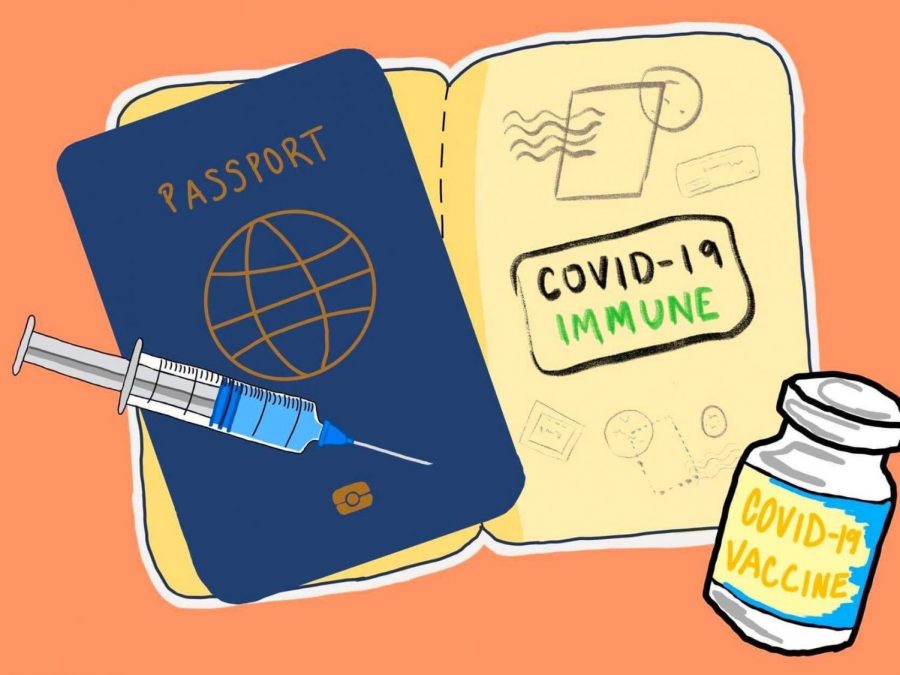Opinion: A premature vaccine passport can threaten public health and equity
The vaccine passport has arrived in New York and is being debated around the country. Vaccine hesitancy poses a fundamental challenge to reaching herd immunity – therefore, a vaccine passport is contingent on increased vaccination efforts.
New York got its first vaccine passport app which is the first government-issued immunity pass in the country. However, the prospect of widespread use of a vaccine passport has prompted both critics and supporters. (Staff Illustration by Manasa Gudavalli)
May 6, 2021
The stark ideological and political divide between American conservatives and liberals has been considered a proxy for one’s views on pandemic-related mandates, including mask-wearing and social distancing guidelines. As vaccination efforts continue throughout the country, the next task seems to be creating an effective and equitable system to open the country safely. While conservative opposition to the vaccine passport is largely misguided in its claims of privacy violations, there should be serious consideration of the inequities a passport could further magnify.
New York’s first vaccine passport app, the Excelsior Pass, was the first government-issued immunity pass in the country. Using it is simple, and it appears to be a reliable tool for reopening efforts. A user can show either proof of full vaccination or proof of a negative test result within the last three days. Roughly 400,000 New Yorkers have downloaded the pass so far, and it has been used at restaurants, sporting events, weddings and even Madison Square Garden.
New York is not the only place that has used a vaccine passport. Israel, China and the United Kingdom are also using similar mechanisms. It is likely that a digital tool showing vaccination status will only become more widespread. The new debate should be about its implementation.
The advantages of a vaccine passport cannot be overlooked. It serves as a versatile tool to ease New York City and the rest of the country back to normalcy. Paper cards, which have been proposed as one alternative to a digital pass, are not necessarily designed to counter fraud. Restrictions on restaurants, venues and other spaces could ease up without posing a threat to public safety. Without assurance of vaccination in such spaces, people may be more hesitant to resume engaging in leisure activities, which further prolongs the pandemic’s economic toll.
One disadvantage that of these passes is that they could be implemented without the continuous and comprehensive vaccination efforts. Opponents of the vaccine passport are conservative, with roughly 47% of Trump voters not in support of the pass compared to only 10% of Biden voters. These figures are worrisome, as experts note that nearly 70% to 80% of the population must be vaccinated in order to reach herd immunity. It is risky to accept conservative hesitancy toward the vaccine as inevitable or immutable. Without addressing such a large portion of the population, new variants could spread at a faster rate. This could set vaccination efforts back by months, or even render already administered vaccines null.
Vaccine passports exacerbate hesitancy among marginalized groups, including Black, Latino and immigrant communities. New York City reached a tipping point with the number of residents seeking vaccines, meaning that the next stage in the vaccination process will be geared toward those who refused a shot. Minority populations have been most impacted by the pandemic while maintaining disproportionately low vaccine numbers. Mistrust of the government among these groups rests on a historical precedent of discrimination by medical and governmental institutions.
Undocumented immigrants, who often face language barriers and a lack of information, have seen low vaccination numbers as well. The vaccine passport raises tracking concerns among these groups, considering their undocumented status. Community outreach efforts and careful messaging of a vaccine passport are necessary to combat this hesitancy, along with determined efforts to increase immunity in underserved areas.
It is undeniable that a system must take effect, but enactment cannot be premature as to provide a false sense of security. The inequalities that persist in the vaccine rollout, among both minority and conservative groups, will have a damaging impact on public health if left unaddressed. Effective preventative vaccinations and the use of a vaccine passport hinge on the creation of a national effort to encompass all demographics in order to reach herd immunity.
Opinions expressed on the editorial pages are not necessarily those of WSN, and our publication of opinions is not an endorsement of them.
Email Lucy Yama at [email protected].
























































































































































